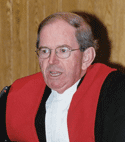” The reform of civil procedure is only half-success .”
This is the record of the Chief Superior Court Chief Justice, Robert Pidgeon , two years after the new Code of Civil Procedurecame into effect .
 Robert Pidgeon, Associate Chief Justice of the Superior Court |
Shunned hearings
Management hearings, which are one of the cornerstones of the reform and which promised to reduce hearing delays and limit the complexity and cost of litigation, are underutilized.
In Pidgeon J.’s view, both judges and lawyers are responsible for it. ” Let’s act before it’s too late, by showing litigants that we can be more effective, innovative and better served, ” he said at a recent conference on management hearings. organized by the Committee on the Superior Court of the Quebec Bar.
Also spoke at the conference, the judges Jean Lemelin and Bernard Godbout of the Superior Court, and M e Daniel Dumais , while M e Michèle Thivierge , Committee Chair of the Superior Court, hosted the meeting.
Skin of sorrow
Despite the reform of the civil procedure, the litigants continue to desert the courts of justice.
In the District of Quebec, between 1998 and 2003, the number of cases in the Superior Court, Civil Division, went from 3,696 to 2,352, a decrease of 36%. Between 2002 and 2003, there were 377 fewer cases.
M e Sylvie Champagne , Committee secretary on civil procedure of the Quebec Bar , confirms that the number of civil cases is decreasing throughout the province, both the Superior Court and the Quebec Court.
Because of these statistics, one would expect a decrease in the number of days judges sit, but the numbers show that the opposite is true.
Heavy problem
Meeting in June 2004 to analyze the situation, the judges of the Appeal District of Quebec identified, among the factors making access to justice more and more difficult, the heaviness of the rules of practice and procedure.
Pidgeon J. observes that lawyers are more likely to use experts. ” More litigants was that make quérulence 1 ,” he said. Some members of the Bar reported to him that the reform, far from having simplified the judicial process, complicated it, notably by the introduction of new forms.
Resistance to change
Two procedures put in place during the reform, settlement conferences and special case management – which allows the assignment of a particular judge to the management of a complex case -, prove popular among lawyers and helped simplify the judicial process.
However, ordinary management hearings, oral argument and the application of the rule of proportionality are met with resistance by members of the Bar and judges alike.
This is probably because these measures are foreign to traditional judicial mores, Pidgeon J. notes. ” The change of culture did not happen ,” he says.
Unknown potential
The Chief Justice of the Court of Quebec, Guy Gagnon , admits, in an interview with the Journal du Barreau , that the potential for maximum use of case management is poorly understood. As a result of the lack of understanding of this potential, periods reserved for ordinary management hearings in the Quebec District have been reduced because of low attendance.
 Guy Gagnon, Chief Justice of the Court of Québec |
The lawyers present themselves in management mainly to file the deadlines established between them on the course of the proceeding, and do not think to use them to advance their files more quickly.
The oral c. writing
Oral contestation still causes much discomfort among lawyers. The plaintiffs are afraid of being taken by surprise, and the defendants fear that their arguments will have less impact without the support of the writing. Chief Justice Guy Gagnon says he understands these reservations. ” Quebec’s procedural tradition is based on the written word, but there are uncomplicated cases where lawyers should agree to make an oral defense ,” he says.
It should be noted that some judges, in the absence of the consent of all parties, are reluctant to order the oral challenge, although the Code of Civil Procedure gives them the power to do so.
Proportionality and balance
The effectiveness of justice can be greatly improved by taking advantage of management hearings to enforce the proportionality rule. This rule of Article 4.2 C. pc provides that ” in any proceeding, the parties must ensure that the selected pleadings are, having regard to the costs and time required, proportionate to the nature and purpose of the and the complexity of the dispute, the judge must do the same with respect to the pleadings that he authorizes or orders “.
This rule allows the judge to intervene to restore the balance and avoid abuses when there is a great disparity of resources between the two parties, as in the case of a litigant pursuing a multinational.
The magistrate could, for example, based on this provision, limit the number of expertises or the duration of an interrogation.
The court may even use it to limit costs or exaggerated expert fees, notes Judge Pidgeon.